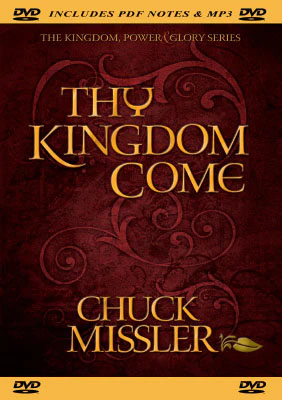There is a figure of merit in optics regarding “resolving power.” If you look at a star with a cheap telescope, you will see a bright spot. If you look at that same star with very high-quality optics, you may discover that that ostensible spot is actually a double star. The ability of the higher quality of optics to resolve two things that are very close together—but separate—is a critical capability for the serious astronomer.
A similar need for precision can occur in language. Attempts to “harmonize” Scripture can often blur critical distinctions that escape all but the very diligent inquirer. An example of this is the erroneous perception that Luke 21 is the same presentation as the Olivet Discourse in Matthew 24 (and Mark 13).1
Another example is Matthew’s unique use of the term, “Kingdom of Heaven.” (He is the only Gospel writer that uses that term: Mark, Luke, and John use the term, “Kingdom of God.”) Most commentators presume that these terms are synonymous. However, Matthew uses “Kingdom of Heaven” 33 times, but also uses “Kingdom of God” five times, even in adjacent verses, which indicates that these are not synonymous: he is using a more denotative term.
(In both Hebrew and German, the prepositions “of” and “from” are the same word. To speak of “Otto Von Hapsburg” refers to the town he originates from, and subsequently becomes a family name.) Matthew’s unique use of the term “Kingdom of Heaven” is a genitive of source rather than a genitive of apposition, and this is one of the pivotal insights that lifts the fog of ostensible synonymy with the more inclusive term “Kingdom of God” used by the other Gospel writers.
The Unconditional Covenants
There are four unconditional covenants in the Scripture:
a) The Abrahamic Covenant2 (from which all of our benefits derive, even as Gentiles);
b) The Land Covenant3 (committing the land to Israel);
c) The Davidic Covenant;4 and
d) The Everlasting Covenant5 (from which the New Testament gets its name).
It is provocative to realize that each of these commitments by the God of the Universe has been, and continues to be, under deliberate and specific attack. The world in general—and the U.N., the E.U., and the current pagans in the corridors of power in Washington in particular—continue to attack the Abrahamic Covenant, and the nation of Israel, and this includes anti-Semitism in all of its forms.
The Land Covenant is, specifically, the primary target of Islam. It’s not the size of Israel that is their issue; it is the very existence of Israel in “their” land.
Strangely, the Davidic Covenant has been, in effect, under attack by many of the “denominational” churches which owe their historical traditions to the Reformation. While the courageous reformers, with re-commitment to the Holy Scriptures for their doctrine and beliefs, acquitted themselves marvelously in the area of soteriology (the study of salvation); they myopically failed to reexamine their eschatology (study of the last things.) Victims of the specious allegorizations of Origen and Augustine, many Christians today are oblivious to the fact that the “Millennium” (heralded in Revelation 20 and throughout the Old Testament) is simply the fulfillment of the Davidic Covenant.
Every Christmas season we send out cards which feature quotations such as:
For unto us a child is born, unto us a son is given: and the government shall be upon his shoulder: and his name shall be called Wonderful, Counsellor, The mighty God, The everlasting Father, The Prince of Peace. Of the increase of his government and peace there shall be no end, upon the Throne of David, and upon his kingdom, to order it, and to establish it with judgment and with justice from henceforth even for ever. The zeal of the LORD of hosts will perform this.
Isaiah 9:6-7
The prophet Daniel lists this earthly kingdom as the fifth in a list of five:
And in the days of these kings shall the God of heaven set up a kingdom, which shall never be destroyed: and the kingdom shall not be left to other people, but it shall break in pieces and consume all these kingdoms, and it shall stand for ever. Forasmuch as thou sawest that the stone was cut out of the mountain without hands, and that it brake in pieces the iron, the brass, the clay, the silver, and the gold; the great God hath made known to the king what shall come to pass hereafter: and the dream is certain, and the interpretation thereof sure.
Daniel 2:44-45
This Davidic Covenant is not only a dominant theme throughout the Old Testament:6 it was confirmed by the Angel Gabriel to Mary at the Annunciation,7 confirmed by Jesus at the Ascension,8 and was a pivotal feature by James at the Council of Jerusalem in Acts 15.9
The Message for Today
As we highlighted in last month’s article, this Kingdom perspective is the primary message to the Laodicean churches of today!10 Most Christians today when they pray, “Thy Kingdom come, thy will be done on earth as it is in heaven,”11 have no idea what they are actually praying for! Even though there are over 2,000 references in the Bible to the return of Christ to rule on the Planet Earth!12
As the impending approach of that very literal Kingdom now looms on our near horizon, it becomes increasingly urgent for all of us to fully apprehend the impending implications for our personal walk and priorities! It is our intense prayer that these studies will prove useful and impacting as we face the challenges which lie ahead.
Our previous briefings on The Origin of Evil, and Eternal Security are part of a comprehensive series which will continue in the months to follow. This particular excerpt has been from Thy Kingdom Come.
Notes:
- See This Generation on p. 35 for a briefing on this misunderstood assumption.
- Genesis 12.
- Genesis 15, 17.
- 2 Samuel 7; Psalm 89.
- Jeremiah 31:31.
- Isaiah 9:6,7; Micah 5:2; Psalm 89; et al.
- Luke 1:32.
- Acts 1: 6,7.
- Acts 15:15-17 (quoting Amos 9:11).
- Revelation 3:14-22.
- Matthew 6:10.
- 1,845 references in the OT; 318 in the NT; J. Barton Payne, Encyclopedia of Biblical Prophecy, Harper & Row, New York 1973.







